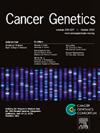58. Myeloma FISH - Lessons learned from a panel redesign
IF 2.1
4区 医学
Q4 GENETICS & HEREDITY
引用次数: 0
Abstract
FISH testing on plasma cell (PC)-enriched bone marrow aspirates is routinely used in the genetic workup of patients with PC neoplasms/multiple myeloma (PCN/MM). Despite enrichment, these samples may exhibit low cellularity, requiring panel design that maximizes assessment of core and emerging markers at highest diagnostic yields. We performed a retrospective analysis and validation work accompanying updates to our MM FISH panel (MMP) which consisted of six hybridizations: IGH::CCND1, IGH::FGFR3, IGH::MAF, IGH::MAFB, 1q CKS1B/17p TP53, and +9 JAK2. The update incorporated previously validated 1p CDKN2C/1q to routinely assess for high risk 1p deletions with 1q gain/amp, and a new 17p/17q probe set. Internal analysis of near 1600 total MMPs with 400 positive +9 (3 or 4 copies) cases showed removal of JAK2 to retain six total hybridizations could result in 5% or 2.5% reduced diagnostic yield amongst abnormal or all cases, respectively, though this loss would be offset by CDKN2C (seen in approximately 10% of MM cases). Amongst positive +9 cases, alternative prognostically significant findings (IGH, 1q, 17p) were seen in 44% and cooccurring +11 ploidy assessment in 40%. Validation of 1p/1q and TP53 probes assessed multiple vendors and hybridization configurations to optimize diagnostic yield, quality, and workflows. Known negative samples are used to establish reference ranges and known negative/positive samples by orthogonal FISH and/or genomic microarray are used for accuracy and precision. An unexpected false negative deletion case was encountered during TP53 accuracy, highlighting consideration for expected and potential patterns of the targeted aberration that may occur during clinical testing.
58.骨髓瘤 FISH - 从面板重新设计中汲取的经验教训
对富集浆细胞(PC)的骨髓穿刺样本进行 FISH 检测是 PC 肿瘤/多发性骨髓瘤(PCN/MM)患者基因检查的常规方法。尽管进行了富集,但这些样本的细胞率可能很低,这就要求在设计面板时最大限度地评估核心标记物和新出现的标记物,以获得最高的诊断率。我们进行了一项回顾性分析和验证工作,同时更新了我们的 MM FISH 面板(MMP),该面板由六种杂交组成:IGH::CCND1、IGH::FGFR3、IGH::MAF、IGH::MAFB、1q CKS1B/17p TP53 和 +9 JAK2。更新版纳入了之前经过验证的 1p CDKN2C/1q 以常规评估高风险 1p 缺失与 1q 增益/amp,以及新的 17p/17q 探针集。对400例+9(3或4个拷贝)阳性病例的近1600个MMPs总数进行的内部分析表明,去除JAK2以保留6个杂交总数可能会导致异常病例或所有病例的诊断率分别降低5%或2.5%,不过CDKN2C(见于约10%的MM病例)会抵消这一损失。在+9阳性病例中,44%的病例出现了对预后有重要意义的其他结果(IGH、1q、17p),40%的病例同时出现了+11倍体评估结果。1p/1q 和 TP53 探针的验证评估了多个供应商和杂交配置,以优化诊断率、质量和工作流程。已知阴性样本用于建立参考范围,通过正交 FISH 和/或基因组芯片检测的已知阴性/阳性样本用于提高准确性和精确度。在 TP53 检测准确性过程中遇到了一个意外的假阴性缺失病例,这突出说明了临床检测过程中可能出现的目标畸变的预期和潜在模式。
本文章由计算机程序翻译,如有差异,请以英文原文为准。
求助全文
约1分钟内获得全文
求助全文
来源期刊

Cancer Genetics
ONCOLOGY-GENETICS & HEREDITY
CiteScore
3.20
自引率
5.30%
发文量
167
审稿时长
27 days
期刊介绍:
The aim of Cancer Genetics is to publish high quality scientific papers on the cellular, genetic and molecular aspects of cancer, including cancer predisposition and clinical diagnostic applications. Specific areas of interest include descriptions of new chromosomal, molecular or epigenetic alterations in benign and malignant diseases; novel laboratory approaches for identification and characterization of chromosomal rearrangements or genomic alterations in cancer cells; correlation of genetic changes with pathology and clinical presentation; and the molecular genetics of cancer predisposition. To reach a basic science and clinical multidisciplinary audience, we welcome original full-length articles, reviews, meeting summaries, brief reports, and letters to the editor.
 求助内容:
求助内容: 应助结果提醒方式:
应助结果提醒方式:


